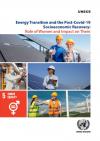Energy and Gender
Introduction

UNECE is helping countries to bridge the gender gap and accelerate the energy transition. To date research and advocacy on women in sustainable energy highlight the significant roles women play in achieving resilient and carbon neutral energy systems.
The energy sector is missing out on the experiences, skills, and talents of much of half the human population, which severely constrains the sustainable energy transition. In addition to a larger skilled workforce, there are several advantages in bridging the gender gap within the energy sector. Gender disparities in the energy sector have been observed around the world. Women are less represented in policymaking, corporate leadership and governance, as entrepreneurs and venture capitalists, and in the labour workforce. Indeed, as it relates to employment, the energy sector is the least gender diverse. While predominantly embedded in the traditionally male-dominated energy sector, opportunities for women abound throughout all these areas.
Studies emphasize the importance of gender-responsive approaches to energy planning and development, recognizing women's unique needs, capabilities, and contributions. Addressing gender disparities in access to energy resources and decision-making processes is crucial for achieving equitable and sustainable energy outcomes, as well as advancing broader gender equality and social development goals.
In focus
Highlights
ACTIVITIES
- Women in Resource Management promotes gender and diversity within the framework of sustainable resource management, with a particular focus on the Micro, Small and Medium Enterprises (MSME) sector.
- Female inclusion in extractive industries: research shows that women are highly underrepresented in most extractive industries. In oil, gas, and mining sectors they remain underrepresented virtually at all levels, yet the imbalance is the most striking at senior ones.
